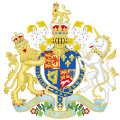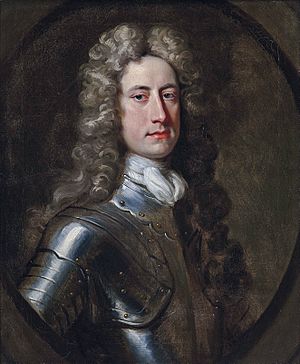Secretary of State for the Northern Department facts for kids
Quick facts for kids Great BritainOffice of the Secretary of State for the Northern Department |
|
|---|---|

Coat of Arms of the Kingdom of Great Britain Government
|
|
| The Northern Department | |
| Style | The Right Honourable (Formal prefix) |
| Member of | British Cabinet |
| Seat | Westminster, London |
| Appointer | The British Monarch on advice of the Prime Minister |
| Term length | No fixed term |
| Formation | 1660-1782 |
| First holder | Sir William Morice |
| Final holder | David Murray, 7th Viscount Stormont |
The Secretary of State for the Northern Department was an important job in the Cabinet of the government of Great Britain. This position existed until 1782. After that, the Northern Department changed into the Foreign Office, and the job became what we now call the Foreign Secretary.
Contents
What Was the Northern Department?
This section explains the history and responsibilities of this old government role.
Early Days: Before Great Britain
Before the Act of Union, 1707, the Secretary of State mainly worked for the English government. It was not yet for the whole of Great Britain. Even after England and Scotland joined, there was sometimes a separate Secretary of State for Scotland. This Scottish role continued from an older job in the Kingdom of Scotland.
Dividing the Work: North and South
Before 1782, there were two main Secretaries of State. They were in charge of the Northern and Southern Departments. Their jobs were divided by geography, not by topic.
The Secretary for the Northern Department handled relations with countries to the north and east. These included the Netherlands, Scandinavia, Poland, Russia, and the Holy Roman Empire.
The Secretary for the Southern Department managed relations with countries to the south. These included Ireland, the Channel Islands, France, Spain, Portugal, Switzerland, the states of Italy, and the Ottoman Empire. This Secretary also looked after the American colonies until 1768. After that, a new job, the Secretary of State for the Colonies, took over.
Both Secretaries shared duties for domestic affairs in England and Wales. After the union with Scotland in 1707, they also took care of Scottish matters when there was no specific Secretary for Scotland.
Changing Importance Over Time
At first, the Southern Department was usually seen as more important. The person in charge of the Northern Department would often move to the Southern Department when a spot opened up.
However, during the reigns of King George I and King George II, the Northern Department grew in importance. This was because it handled matters related to the monarchs' original home, Hanover. By the time George III was king, both departments were seen as equally important.
How the Role Changed
In 1782, the two Secretary of State roles were reorganized. They became the Secretary of State for the Home Department and the Secretary of State for Foreign Affairs.
During the 1700s, if a Secretary of State for the Northern Department was a peer (a noble), they often also led the House of Lords.
Secretaries of State for the Northern Department (1660–1782)
Here is a list of the people who held the important job of Secretary of State for the Northern Department.
| Portrait | Name Constituency |
Term of office | Notes | |
|---|---|---|---|---|
 |
Sir William Morice MP for Plymouth |
27 May 1660 |
29 September 1668 |
|
 |
Sir John Trevor MP for Arundel until 1661 MP for Great Bedwyn after 1661 |
29 September 1668 |
8 July 1672 |
|
 |
Henry Coventry MP for Droitwich |
3 July 1672 |
11 September 1674 |
|
 |
Sir Joseph Williamson MP for Thetford |
11 September 1674 |
20 February 1679 |
|
 |
Robert Spencer The Earl of Sunderland |
10 February 1679 |
26 April 1680 |
|
 |
Sir Leoline Jenkins MP for Oxford University |
26 April 1680 |
2 February 1681 |
|
 |
Edward Conway The Earl of Conway |
2 February 1681 |
January 1683 |
|
 |
Robert Spencer The Earl of Sunderland |
28 January 1683 |
1684 | |
 |
Sidney Godolphin MP for Helston |
17 April 1684 |
24 August 1684 |
|
 |
Charles Middleton The Earl of Middleton MP for Winchelsea after 1685 |
24 August 1684 |
28 October 1688 |
|
 |
Richard Graham The Viscount Preston MP for Cumberland |
29 October 1688 |
2 December 1688 |
|
 |
Daniel Finch The Earl of Nottingham |
5 March 1689 |
26 December 1690 |
|
 |
Henry Sydney The Viscount Sydney |
26 December 1690 |
3 March 1692 |
|
 |
Sir John Trenchard MP for Poole |
23 March 1693 |
2 March 1694 |
|
 |
Charles Talbot The Duke of Shrewsbury |
2 March 1694 |
3 May 1695 |
|
 |
Sir William Trumbull MP for Oxford University |
3 May 1695 |
2 December 1697 |
|
 |
James Vernon MP for Penryn until 1699 MP for Westminster after 1699 |
2 December 1697 |
5 November 1700 |
|
 |
Sir Charles Hedges MP for Malmesbury |
5 November 1700 |
29 December 1701 |
|
 |
James Vernon MP for Westminster |
4 January 1702 |
1 May 1702 |
|
 |
Sir Charles Hedges MP for Malmesbury until 1702 MP for Calne after 1702 |
2 May 1702 |
18 May 1704 |
|
 |
Robert Harley MP for Radnor |
16 May 1704 |
13 February 1708 |
|
 |
Henry Boyle MP for Westminster |
13 February 1708 |
21 September 1710 |
|
 |
Henry St John The Viscount Bolingbroke MP for Berkshire until 1712 Viscount Bolingbroke after 1712 |
21 September 1710 |
17 August 1713 |
|
 |
Sir William Bromley MP for Oxford University |
17 August 1713 |
17 September 1714 |
|
 |
Charles Townshend The Viscount Townshend |
17 September 1714 |
12 December 1716 |
|
 |
James Stanhope | 12 December 1716 |
12 April 1717 |
|
 |
Charles Spencer The Earl of Sunderland |
12 April 1717 |
2 March 1718 |
|
 |
James Stanhope The Earl Stanhope |
19 March 1718 |
4 February 1721 |
|
 |
John Carteret The Lord Carteret |
5 February 1721 |
21 February 1721 |
|
 |
Charles Townshend 2nd Viscount Townshend |
21 February 1721 |
16 May 1730 |
|
 |
William Stanhope The Lord Harrington |
19 June 1730 |
12 February 1742 |
|
 |
John Carteret The Lord Carteret |
12 February 1742 |
24 November 1744 |
|
 |
William Stanhope The Earl of Harrington |
24 November 1744 |
January 1746 |
|
 |
John Carteret The Earl Granville |
12 February 1746 |
March 1746 |
as sole Secretary |
 |
William Stanhope The Earl of Harrington |
March 1746 |
19 October 1746 |
|
 |
Philip Dormer Stanhope The Earl of Chesterfield |
29 October 1746 |
6 February 1748 |
|
 |
Thomas Pelham-Holles The Duke of Newcastle |
6 February 1748 |
23 March 1754 |
|
 |
Robert Darcy The Earl of Holdernesse |
April 1757 |
June 1757 |
as sole Secretary |
 |
John Stuart The Earl of Bute |
25 March 1761 |
27 May 1762 |
|
 |
George Grenville MP for Buckingham |
5 June 1762 |
9 October 1762 |
|
 |
George Montagu-Dunk The Earl of Halifax |
14 October 1762 |
9 September 1763 |
|
 |
John Montagu The Earl of Sandwich |
9 September 1763 |
10 July 1765 |
|
 |
George Montagu-Dunk The Earl of Halifax |
September 1763 |
July 1765 |
|
 |
Augustus Henry Fitzroy The Duke of Grafton |
12 July 1765 |
14 May 1766 |
|
 |
Henry Seymour Conway MP for Thetford |
23 May 1766 |
20 January 1768 |
|
 |
Thomas Thynne The Viscount Weymouth |
20 January 1768 |
21 October 1768 |
|
 |
William Nassau de Zuylestein The Earl of Rochford |
21 October 1768 |
19 December 1770 |
|
 |
John Montagu The Earl of Sandwich |
19 December 1770 |
12 January 1771 |
|
 |
George Montagu-Dunk The Earl of Halifax |
22 January 1771 |
6 June 1771 |
|
 |
Henry Howard The Earl of Suffolk |
12 June 1771 |
7 March 1779 |
|
 |
David Murray The Viscount Stormont |
27 October 1779 |
27 March 1782 |
|
See Also
Sources
 | DeHart Hubbard |
 | Wilma Rudolph |
 | Jesse Owens |
 | Jackie Joyner-Kersee |
 | Major Taylor |


